“El aumento de la complejidad a veces experimenta saltos bruscos. Existen ciertos tamaños por debajo de los cuales nuestras relaciones son simples; pero una vez que superamos ese límite, la estructura social se vuelve más compleja de forma muy rápida”, explican los investigadores de la Facultad de Física de la USC, Martín Saavedra, Jorge Mira y Alberto P. Muñuzuri; y Luis F. Seoane del CSIC. “¿Que es un pueblo? ¿Y una ciudad? Sabemos que se diferencian en el número de habitantes, pero intuimos algo más: la vida social de una aldea nos parece mucho más sencilla que la de una capital, por ejemplo. Los humanos nos organizamos en grupos de tamaños muy distintos, desde un equipo de rugby, pasando por una provincia, hasta una nación”, añaden.
Metodología
El equipo estudió los procesos sociolingüísticos acontecidos en Galicia a lo largo de los últimos cien años. En este tiempo, el gallego tendió a ser sustituido por el castellano, a pesar de que las dos son lenguas romances con alta inteligibilidad mutua, lo que habilita el bilingüismo y podría sostener la coexistencia de los dos idiomas a largo plazo. Estas dinámicas se desplegaron al mismo tiempo, a diferentes velocidades, en núcleos rurales y en grandes ciudades. Galicia contiene la mitad de las 60.000 entidades singulares de población que hay en el conjunto del Estado, de las cuales 27.000 son núcleos con menos de cien habitantes, hecho que permitió a los investigadores contar con grupos sociales de diversa complejidad a la hora de abordar la evolución de este fenómeno.
“Esta distribución nos brindó una oportunidad única de estudiar en que escalas sociales emergentes el comportamiento humano se ve alterado de manera notoria”, explican. Según su hipótesis, cuando más sencilla fuera la red social de cada municipio, más rápido deberían acontecer los cambios correspondientes, mientras que en ciudades como A Coruña o Vigo deberían llevar más tiempo.
De Dunbar a Platón
Los investigadores ordenaron estas velocidades de cambio según la fracción de población urbana en cada región. Con esto descubrieron que hay tamaños” en los cuales la complejidad de la red social pega un “acelerón”. Las escalas singulares se localizan alrededor de 180 y 5.000 habitantes, ambos números muy significativos en el estudio de la complejidad de grupos humanos. 180 es el más destacado por su cercanía al llamado número de Dunbar, antropólogo que teorizó sobre la cantidad de personas que pueden relacionarse plenamente en un grupo social. “Por encima de este número resultaría más complicado prestar la atención suficiente a nuestras relaciones, que acabarían colapsando”, apuntan los científicos. Investigaciones previas mostraron como animales con diferentes capacidades cognitivas tienen un número de Dunbar acorde, lo cual condiciona el tamaño de los grupos que pueden establecer. “Esta investigación muestra que los humanos desarrollamos grupos por encima de ese límite cognitivo aún a riesgo de que nuestras redes sociales se vuelvan mucho más complejas”, añaden.
La otra escala singular detectada, 5.000 personas, entronca con lo que sucede en varios ordenamientos territoriales ya que la legislación española marca cambios en ayuntamientos con más de 5.000 habitantes, siendo este también uno de los límites en los que se producen modificaciones en la composición de los plenos municipales, entre otros. Los autores apuntan como curiosidad que esta cantidad coincide casi con 5.040, el número que Platón identificaba como el tamaño ideal de su polis utópica. Esta nueva investigación muestra que algo singular sucede en los grupos sociales alrededor de ese tamaño a pesar de que “parece que la intuición política humana ya había notado la relevancia de esa escala, y que la incorporó de diversas maneras a nuestra forma de organizarnos”, señalan.
Noticia elaborada por el Gabinere de Comunicación de la Universidad de Santiago






